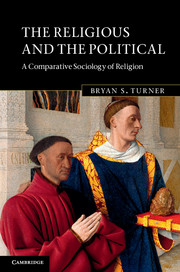Book contents
- Frontmatter
- Contents
- Acknowledgements
- Introduction
- Part I The religious and the political
- 1 Fear of diversity: the origin of politics
- 2 Charisma and church–state relations
- 3 City, nation and globe: the rise of the church and the citizen
- Part II State management of religion
- Part III Comparative and historical studies
- Part IV Conclusion
- References
- Index
3 - City, nation and globe: the rise of the church and the citizen
Published online by Cambridge University Press: 05 April 2013
- Frontmatter
- Contents
- Acknowledgements
- Introduction
- Part I The religious and the political
- 1 Fear of diversity: the origin of politics
- 2 Charisma and church–state relations
- 3 City, nation and globe: the rise of the church and the citizen
- Part II State management of religion
- Part III Comparative and historical studies
- Part IV Conclusion
- References
- Index
Summary
Introduction: three events
In order to frame a discussion of space, sovereignty and religion in the construction of modern citizenship, I hang my argument on three events in Western history and three texts. These are the writings of St Augustine, specifically The City of God (c. 413–26), the Treaty of Westphalia (1648) and the Declaration of Human Rights (1948). All three texts were set against and arose out of a background of violence and destruction: Alaric’s sacking of Rome in 410 CE, the legacy of the Wars of Religion, and the civilian casualties of the Second World War and later the emerging recognition of the Holocaust. These violent events were at the time seen to be catastrophic, bringing into question the very bases of civilized life. They exposed the vulnerability of the human body and the precarious character of social institutions. These settlements were woven around problems of difference, violence and exclusion: the Jews in early Christianity; Protestant dissent in relation to the hegemony of the Catholic Church and the authority of the Pope during the Wars of Religion; and genocide, ethnic cleansing and displaced populations as the background to the Declaration. These three texts sought to imagine different social arrangements to control or at least mitigate human violence, and in the process these documents involved a conceptualization of the citizen-subject with respect to the city, the nation and finally the globe. Each stage of the conceptualization and redefinition of rights involved a breakdown of the previous framework such as the imperial city, the ecclesiastical structure of Christendom and the nation-state system.
- Type
- Chapter
- Information
- The Religious and the PoliticalA Comparative Sociology of Religion, pp. 55 - 80Publisher: Cambridge University PressPrint publication year: 2013



